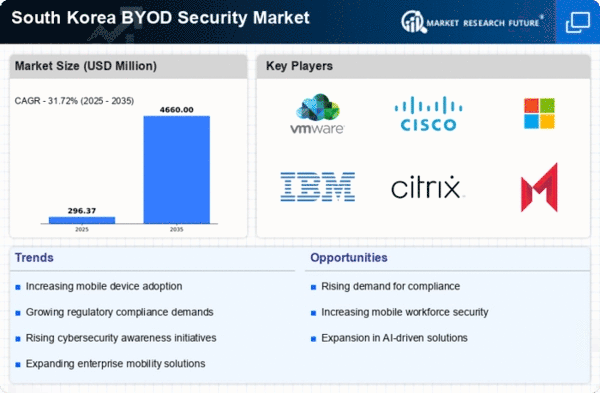Rising Cyber Threats
There is heightened demand for BYOD security solutions in South Korea due to the increasing frequency and sophistication of cyber threats. As organizations adopt BYOD policies, the risk of data breaches and unauthorized access escalates. Recent statistics indicate that cyberattacks in South Korea have surged by approximately 30% over the past year, prompting businesses to prioritize security measures. This trend necessitates the implementation of robust security solutions to safeguard sensitive information accessed through personal devices. Consequently, the byod security market is likely to expand as companies seek to mitigate risks associated with mobile device usage, ensuring compliance with data protection regulations and maintaining customer trust.
Growing Mobile Workforce
The shift towards a mobile workforce in South Korea is significantly influencing the byod security market. With an increasing number of employees working remotely or on-the-go, organizations are compelled to adopt BYOD policies to enhance productivity. According to recent data, around 60% of South Korean companies have implemented BYOD strategies, which has led to a corresponding rise in the need for effective security solutions. This trend underscores the importance of securing personal devices that access corporate networks, as the potential for data leakage and security breaches rises. As a result, the byod security market is poised for growth, driven by the necessity to protect organizational assets in a mobile-centric work environment.
Increased Awareness of Data Privacy
The rising awareness of data privacy issues among consumers and businesses is significantly impacting the byod security market in South Korea. As individuals become more conscious of their personal information and its potential misuse, organizations are compelled to adopt stringent security measures to protect sensitive data accessed through personal devices. Surveys indicate that approximately 70% of South Korean consumers express concerns regarding data privacy, prompting businesses to prioritize security in their BYOD policies. This heightened awareness is likely to drive the demand for advanced security solutions, as organizations strive to build trust with their customers and comply with evolving data protection regulations. Consequently, the byod security market is expected to expand as companies invest in robust security frameworks.
Regulatory Pressures and Compliance Requirements
Regulatory pressures and compliance requirements are increasingly influencing BYOD security in South Korea. Government initiatives aimed at enhancing data protection and cybersecurity are compelling organizations to adopt stringent security measures for personal devices. Recent legislation mandates that companies implement comprehensive security protocols to safeguard sensitive information, which has led to a surge in demand for BYOD security solutions. As organizations navigate these regulatory landscapes, the need for compliance becomes paramount, driving investments in security technologies. This trend suggests that the byod security market will continue to grow as businesses seek to align their practices with regulatory expectations and protect their data assets.
Technological Advancements in Security Solutions
Innovations in security technologies are playing a pivotal role in shaping the byod security market in South Korea. The emergence of advanced solutions such as mobile device management (MDM) and endpoint security software has enabled organizations to better manage and secure personal devices. Recent reports suggest that the adoption of MDM solutions has increased by 25% among South Korean enterprises, reflecting a growing recognition of the need for comprehensive security measures. These advancements not only enhance the protection of sensitive data but also facilitate compliance with regulatory requirements. As organizations continue to embrace these technologies, the byod security market is expected to witness substantial growth, driven by the demand for effective security frameworks.
















